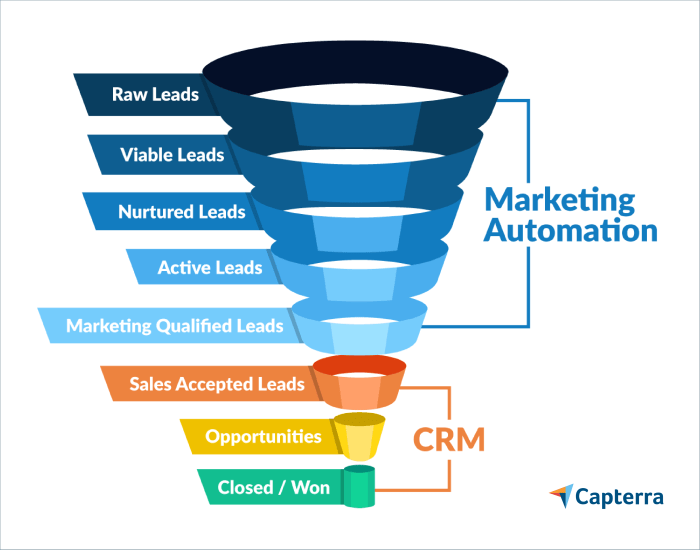CRM and marketing automation are pivotal in today’s digital landscape, enabling businesses to streamline their processes while enhancing customer relationships. These integrated systems provide organizations with the tools necessary to manage interactions, automate repetitive tasks, and analyze data effectively. As competition grows, understanding the synergy between CRM and marketing automation becomes essential for achieving a significant edge in the market.
The evolution of these technologies illustrates their increasing importance, with CRM systems developing from simple contact databases to comprehensive platforms that leverage analytics and automation. By combining CRM with marketing automation, businesses can not only improve efficiency but also deliver personalized experiences that resonate with customers, ultimately driving growth and loyalty.
Overview of CRM and Marketing Automation

Customer Relationship Management (CRM) and marketing automation represent two pivotal components of modern business strategies. CRM systems are designed to manage a company’s interactions with current and potential customers, while marketing automation tools streamline and automate marketing tasks and workflows. The integration of these two systems is increasingly recognized as vital for businesses aiming to enhance their customer engagement and overall efficiency.
The importance of integrating CRM with marketing automation lies in the seamless flow of data between sales and marketing teams, enabling a holistic view of customer interactions. This integration allows for personalized marketing efforts, improved lead management, and consistent messaging across all channels. As technology has evolved, CRM systems have transitioned from simple contact management databases to sophisticated platforms equipped with advanced analytics, AI capabilities, and seamless integration with various marketing tools.
Benefits of CRM and Marketing Automation Integration
Combining CRM with marketing automation offers several compelling benefits that can transform a business’s approach to customer engagement and sales strategies.
- Enhanced Customer Experience: Integration allows for personalized communication based on customer data, leading to more relevant interactions and improved satisfaction.
- Sales and Marketing Alignment: By sharing data and insights, sales and marketing teams can work together more effectively, ensuring that marketing campaigns resonate with customer needs.
- Increased Efficiency: Automating repetitive tasks allows teams to focus on strategic initiatives rather than manual processes, significantly boosting productivity.
- Data-Driven Decisions: Access to comprehensive analytics enables better decision-making based on customer behavior and preferences.
Essential Features of CRM and Marketing Automation Tools
A successful CRM platform and marketing automation tool must encompass a variety of essential features to be effective in today’s market.
- Contact Management: Centralized database for tracking customer interactions and history.
- Email Marketing: Ability to create, send, and analyze email campaigns efficiently.
- Lead Scoring: Mechanism to prioritize leads based on interaction and engagement levels.
- Analytics and Reporting: Comprehensive tools for analyzing campaign performance and customer data.
Popular CRM and marketing automation tools include Salesforce, HubSpot, and Zoho CRM, each offering unique features and functionalities that cater to different business needs.
Implementation Strategies for CRM and Marketing Automation
Implementing CRM and marketing automation systems requires a strategic approach to ensure a smooth transition and successful integration.
- Assessment of Needs: Evaluate the specific needs of your business to select the right tools and features.
- Data Migration: Plan for the secure transfer of existing customer data into the new systems.
- Training: Provide comprehensive training for all users to maximize the benefit from the new tools.
- Testing: Conduct rigorous testing before full deployment to identify and resolve any issues.
Common challenges during implementation may include resistance to change and data integration issues. Solutions involve effective change management strategies and utilizing experts for data migration.
Best Practices for Utilizing CRM and Marketing Automation
To maximize the effectiveness of CRM and marketing automation, several best practices should be followed.
- Regular Data Clean-Up: Maintain an accurate and updated database to improve decision-making.
- Consistent Communication: Foster collaboration between sales and marketing teams to ensure aligned messaging.
- Utilize Customer Feedback: Implement feedback mechanisms to enhance customer experience and adapt strategies accordingly.
A checklist for ongoing management and optimization should include regular performance reviews, updates on new features, and continuous training for users to keep up with the latest tools.
Measuring Success in CRM and Marketing Automation
Tracking the effectiveness of CRM and marketing automation tools relies on specific key performance indicators (KPIs) that provide insights into performance.
- Lead Conversion Rate: Percentage of leads that convert into customers.
- Customer Retention Rates: Measure the ability to retain customers over a period.
- Return on Investment (ROI): Analyze the financial return generated from marketing efforts compared to the cost.
A framework for measuring ROI should involve setting clear objectives, tracking costs, and aligning metrics with business goals. Tools such as Google Analytics and CRM-built reporting features can facilitate performance analysis.
Future Trends in CRM and Marketing Automation

The landscape of CRM and marketing automation is continually evolving, with emerging trends shaping its future.
- Artificial Intelligence: AI is enhancing predictive analytics and customer interaction personalization, transforming how businesses engage with customers.
- Omnichannel Marketing: A unified approach across multiple channels is becoming essential for providing a cohesive customer experience.
- Integration with IoT: The Internet of Things is providing new data sources, offering deeper insights into customer behavior and preferences.
Predictions point towards an increasingly automated and data-driven landscape, where businesses that leverage these advancements will gain a competitive edge in customer relationship management.
Final Summary: CRM And Marketing Automation

In summary, leveraging CRM and marketing automation together offers a multitude of benefits, from enhanced customer experience to improved sales alignment. As businesses navigate the complexities of implementation, adhering to best practices and measuring success through relevant KPIs will be key. Looking ahead, the integration of advanced technologies like artificial intelligence will shape the future of CRM and marketing automation, presenting exciting opportunities for businesses to innovate and excel.
